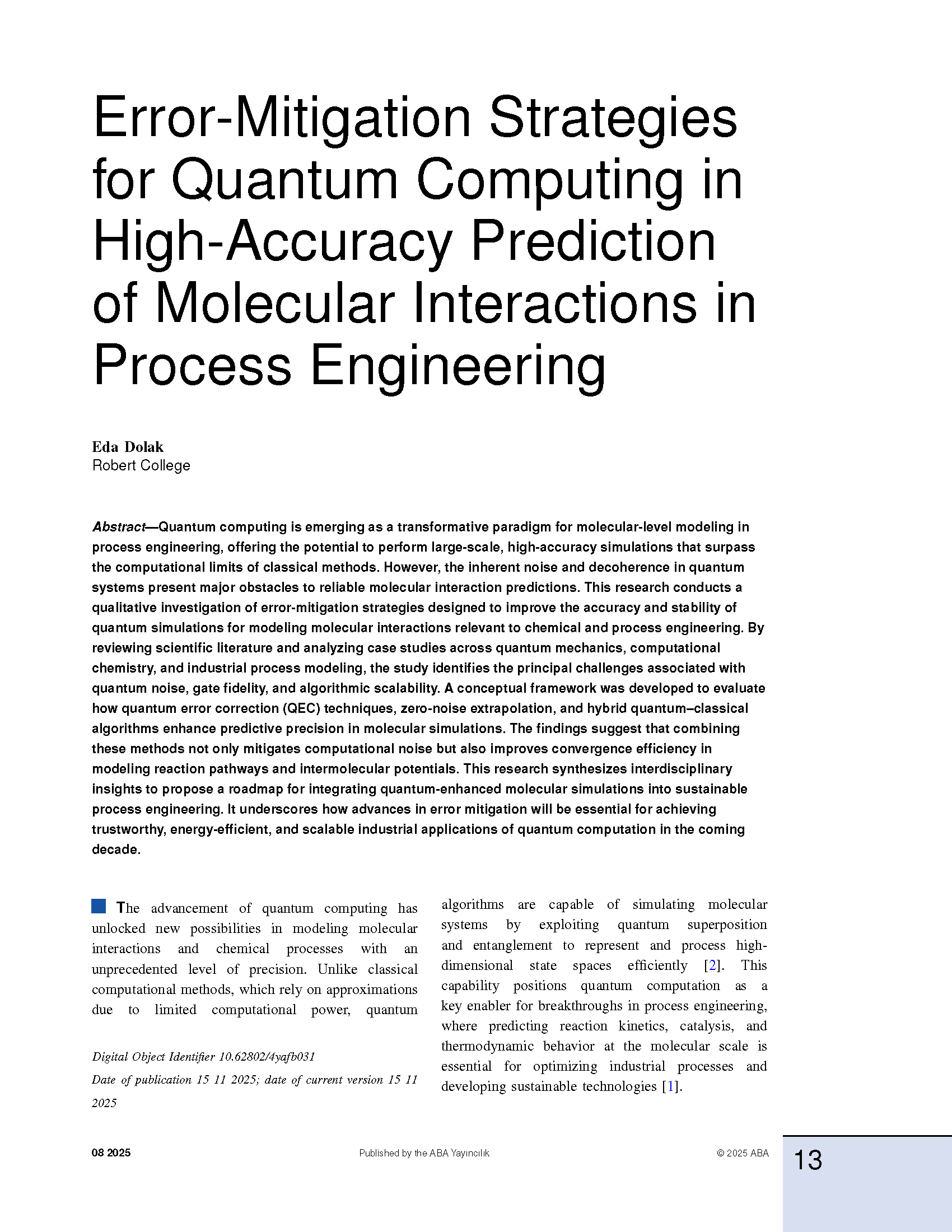Error-Mitigation Strategies for Quantum Computing in High-Accuracy Prediction of Molecular Interactions in Process Engineering
DOI:
https://doi.org/10.62802/4yafb031Keywords:
quantum error mitigation, molecular interactions, process engineering, hybrid quantum–classical algorithms, computational chemistry, noise reduction, quantum simulation accuracyAbstract
Quantum computing is emerging as a transformative paradigm for molecular-level modeling in process engineering, offering the potential to perform large-scale, high-accuracy simulations that surpass the computational limits of classical methods. However, the inherent noise and decoherence in quantum systems present major obstacles to reliable molecular interaction predictions. This research conducts a qualitative investigation of error-mitigation strategies designed to improve the accuracy and stability of quantum simulations for modeling molecular interactions relevant to chemical and process engineering. By reviewing scientific literature and analyzing case studies across quantum mechanics, computational chemistry, and industrial process modeling, the study identifies the principal challenges associated with quantum noise, gate fidelity, and algorithmic scalability. A conceptual framework was developed to evaluate how quantum error correction (QEC) techniques, zero-noise extrapolation, and hybrid quantum–classical algorithms enhance predictive precision in molecular simulations. The findings suggest that combining these methods not only mitigates computational noise but also improves convergence efficiency in modeling reaction pathways and intermolecular potentials. This research synthesizes interdisciplinary insights to propose a roadmap for integrating quantum-enhanced molecular simulations into sustainable process engineering. It underscores how advances in error mitigation will be essential for achieving trustworthy, energy-efficient, and scalable industrial applications of quantum computation in the coming decade.
References
Al-Raeei, M. (2025). Integrating artificial intelligence into thermodynamics: A new paradigm for sustainable future. AIP Advances, 15(6).
Keçeci, M. (2025). Understanding Quantum Mechanics through Hilbert Spaces: Applications in Quantum Computing.
Nursahira, A., Safitri, R., Alvin, M., Sitepu, M. A. B., Sembiring, D. J. M., & Ginting, D. P. S. B. (2025). Hybrid Quantum-Classical Computing: Benchmarking Algorithm Performance on Near-Term Quantum Processors for Optimization Problems. Jurnal Info Sains: Informatika dan Sains, 15(01), 262-271.
Njoku, T. K. (2025). Quantum software engineering: algorithm design, error mitigation, and compiler optimization for faulttolerant quantum computing. Int J Comput Appl Technol Res, 14(4), 30-42.
Patel, P. S., & Desai, D. B. (2025). Review of qubit-based quantum sensing. Quantum Information Processing, 24(3), 1-37.
Rawat, K. S., & Yadav, M. (2025). Analyzing quantum computing applications across key scientific domains using trends and visual analytics. Archives of Computational Methods in Engineering, 1-32.
Thakur, V. S., Kumar, A., Magarini, M., Dev, K., & Dobre, O. A. (2025). Quantum Communication and Information Technologies: A Survey on Foundation, Error Correction, NISQ, and Networks. Authorea Preprints.
Tian, Q., Li, Q., Zhang, T., Huang, W., Zhao, C., Hu, B., & Xu, X. (2025). Molecular Orbital Level Micro‐Electric Field in Green Fenton‐Like Chemistry for Water Treatment: From Mechanism Understanding to Scale‐Up Applications. Advanced Materials, e09280.









